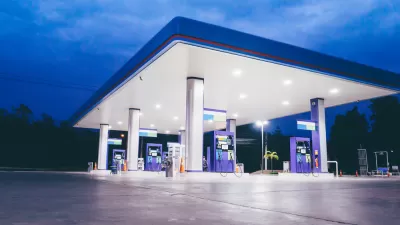Charles Krauthammer offers his own brand of gas tax hike that differs from others mentioned recently. One, it's much bigger. Two, revenues won't be used for transportation. It would be revenue neutral; all funds would be returned to taxpayers.
Truth #1: "The only time you can even think of proposing a gas tax increase is when oil prices are at rock bottom," opines Krauthammer—and that's exactly what several state and a few federal legislators are doing. Of course, others would argue that in fact, there really is never a "Good Time to Increase the Federal Gas Tax."
Truth #2: Krauthammer has been arguing for gas tax increases for a long time, an incredible 32 years. His 2004 column is referenced in a 2008 post that is as relevant today as it was then, so he brings consistency, if not success, to his perspective. Most importantly, as an influential conservative columnist, he might be able to sway some on the political right who many see as the chief impediments to raising the 21-year-old federal gas tax.
In his latest piece, Krauthammer notes that some in Congress have proposed gas tax increases, e.g., the Corker-Murphy plan (12-cents), and Rep. Earl Blumenauer (D-Ore.) indicated on January 15 that he would reintroduce his 2013 UPDATE Act (15-cents), according to the Associated Press.
Krauthammer wants to increase the gas tax by $1. "And the proceeds should not be spent by, or even entrusted to, the government. They should be immediately and entirely returned to the consumer by means of a cut in the Social Security tax," he writes. For those not working, he'd rebate the the gas tax revenue to unemployment insurance or Social Security checks."
Of course, rebating the entire $1 per gallon to taxpayers would leave the Highway Trust Fund in the same predicament it is now, namely having insufficient revenue to match transportation spending—but that's not why Krauthammer wants a gas tax increase.
It's not only refreshing to read (again and again) Krauthammer advocate for what some economists and some environmentalists have long argued: "reduce the disincentive for work (the Social Security tax) and to increase the disincentive to consume gasoline."
Furthermore, it was nice to see his column emphasize not that we are the world's largest producer of crude oil, but that we are the largest consumer.
As for oil, we remain the world champion consumer. We burn more than 20 percent of global output, almost twice as much as the next nearest gas guzzler, China.
And it's always refreshing to see a conservative columnist speak to carbon emissions, and ways to reduce them.
And finally, lower consumption reduces pollution and greenhouse gases. And even for global warming skeptics, there’s no reason not to welcome a benign measure that induces prudential reductions in CO2 emissions.
Returning to world of political reality from the realm of possibility, the latest developments don't look good for a 10-cents gas tax increase, much less a buck.
We noted here just over a week ago that Sen John Thune, the new chairman of the Senate Committee on Commerce, Science and Transportation "surprised the media when he announced on a Sunday morning talk show that a gas tax increase is possible." That didn't last long.
Joan Lowy of the Associated Press reports that the chairman has apparently had a change of heart.
"I can't see a scenario for some sort of user fee increase that you'd have to offset with tax relief in some other area," he told reporters. "Nobody is going to vote for a gas tax increase."
FULL STORY: Raise the gas tax. A lot.

Maui's Vacation Rental Debate Turns Ugly
Verbal attacks, misinformation campaigns and fistfights plague a high-stakes debate to convert thousands of vacation rentals into long-term housing.

Planetizen Federal Action Tracker
A weekly monitor of how Trump’s orders and actions are impacting planners and planning in America.

In Urban Planning, AI Prompting Could be the New Design Thinking
Creativity has long been key to great urban design. What if we see AI as our new creative partner?

How Trump's HUD Budget Proposal Would Harm Homelessness Response
Experts say the change to the HUD budget would make it more difficult to identify people who are homeless and connect them with services, and to prevent homelessness.

The Vast Potential of the Right-of-Way
One writer argues that the space between two building faces is the most important element of the built environment.

Florida Seniors Face Rising Homelessness Risk
High housing costs are pushing more seniors, many of them on a fixed income, into homelessness.
Urban Design for Planners 1: Software Tools
This six-course series explores essential urban design concepts using open source software and equips planners with the tools they need to participate fully in the urban design process.
Planning for Universal Design
Learn the tools for implementing Universal Design in planning regulations.
Gallatin County Department of Planning & Community Development
Heyer Gruel & Associates PA
JM Goldson LLC
City of Camden Redevelopment Agency
City of Astoria
Transportation Research & Education Center (TREC) at Portland State University
Jefferson Parish Government
Camden Redevelopment Agency
City of Claremont



























